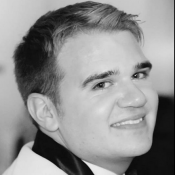It’s a cold and snowy morning in mid-January, and a group of people are gathered in a small rehearsal space, charmingly called The Box and tucked away just off Niagara Street. They’re here to rehearse ‘Ohio’ & Tadeu End Their Lives in Montague Parkette, by artist, and now composer/librettist, Bruce Dow. He’s subtitled this workshop Rhubarb production Sketches from Act One for a New Opera (?). I’m here as a dramaturgical intern. I watch in fascination as Bruce leads them through the piece’s demanding arias.
He nods approvingly at the performers as one section winds down. “Yeah yeah, you just have to count that section right out,” he tells them, his warm eyes twinkling. “Any questions or worries?” There are not. “All right guys, once more for the Baby Jesus.”
Their voices fill the room.
***
In a strange twist, ‘Ohio’ & Tadeu would not be seeing its première at the 36th Annual Rhubarb Festival this week if Dow hadn’t been, as he put it at our first meeting at a Starbucks, scooped. After submitting his initial concept to the festival, Dow learned that the story he’d planned on telling was already being produced by another artist in a different city. But inspiration struck in the form of a childhood memory: he recalled seeing a puppet production of Chikamatsu Monzaemon’s The Love Suicides at Sonezaki. What would happen, he wondered, if he adapted the narrative to contemporary times, and set it in a queer context?
The result is a dark, gritty love story, stripped down to bare essentials, without the pomp and circumstance one (or at least, uh, I) associate with opera. The piece tells the story of a budding romance between ‘Ohio’ (played by Jordan Bell), a young trans girl currently living on the street, and Tadeu, or Tad (played by Jordan Fantauzzo), a working-class Portuguese boy. But love, Dow asserts, can blossom in the oddest places: the self-loathing Tad relentlessly bullied ‘Ohio’—then named Michael—when they both attended Parkdale High School. This history of abuse haunts the new relationship, especially when figures from their shared past (Kayla Coolen, Cassie Doane, and Danik McAfee) bring the plot to a gripping climax in the grim, and appropriately titled, Montague Parkette.
One of my greatest pleasures in being involved with the process has been observing Dow’s great attention to detail. ‘Ohio’ & Tadeu is a sharp examination of the enormous challenges facing homeless LGBT (particularly transgender) youth, and Dow and the creative team have diligently worked to ensure no false notes. From the “gloss of Shoppers Drug Mart make-up” found on the characters’ faces, to the cold bench and flashing police car lights of the Parkette’s nightscape, ‘Ohio’ and Tad’s world is recognizably our own. Even the language is eerily familiar; Dow has opted for a verismo vocal style that means the teenagers sound like, well, teenagers. (For example, one of the show’s climactic lines of song, and a personal favourite of mine, is “Fuck you, you fucking piece of shit.”) Finally, the characters themselves cite real-world events. “They say that it’s fair,” sings ‘Ohio’ to her lover, “Nothing is fair / It doesn’t get better,” acidly referencing both liberal platitudes in general and The It Gets Better Project in particular.
Through the figures of ‘Ohio’ and Tadeu, Dow is giving a voice to those who remain on the margins of society, while ensuring that their suffering remains de-glamourized. Musing on her newly adopted name, ‘Ohio’ tells Tad of an encounter with “a guy / Spoke Japanese,” who said “ohayu gozaimasu” to her. It means “good morning,” but ‘Ohio’ mistakenly believes the man is describing her when he gives her the literal translation of “‘special,’ ‘strange,’ ‘unique,’ and ‘rare.’” The terms are accurate as descriptors for the character, of course, but after seeing ‘Ohio’ & Tadeu, I hope you’ll agree with me that they are just as applicable to the piece itself.
– – – – – – – – – –
photograph by Vince Ha


